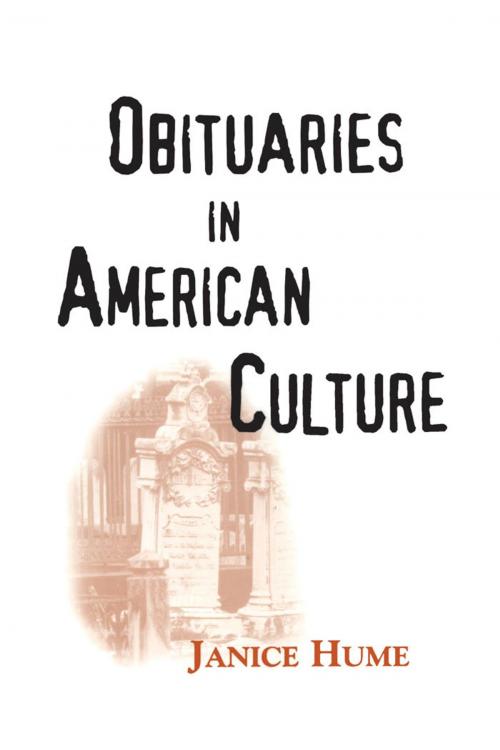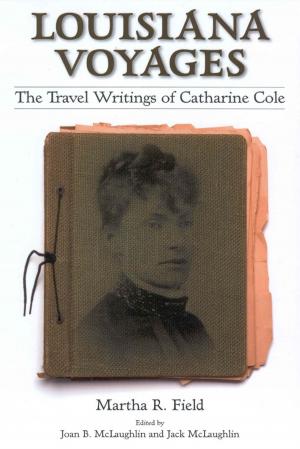Obituaries in American Culture
Nonfiction, Social & Cultural Studies, Social Science, Cultural Studies, Death & Dying| Author: | Janice Hume | ISBN: | 9781604736489 |
| Publisher: | University Press of Mississippi | Publication: | July 5, 2000 |
| Imprint: | University Press of Mississippi | Language: | English |
| Author: | Janice Hume |
| ISBN: | 9781604736489 |
| Publisher: | University Press of Mississippi |
| Publication: | July 5, 2000 |
| Imprint: | University Press of Mississippi |
| Language: | English |
What obituaries tell us about our culture, past and present
"Within the short period of a year she was a bride, a beloved wife and companion, a mother, a corpse," reported The National Intelligencer on the death of Elizabeth Buchanan in 1838.
Such obituaries fascinate us. Few of us realize that, when examined historically, they can reveal not only information about the departed but also much about American culture and about who and what we value. They also offer hints about the way Americans view death.
This book also will fascinate, for it surveys more than 8,000 newspaper obituaries from 1818 to 1930 to show what they reveal about our culture. It shows how, in memorializing individual citizens, obituaries make a public expression of our values. Far from being staid or morbid, these death notices offer a lively look at a changing America. Indeed, obits are little windows through which to view America's cultural history.
In the nineteenth century, they spoke of a person's character, in the twentieth of a person's work and wealth. In the days when women were valued mainly in their relationships with men, their obituaries were about the men in their lives. Then, as now, important friendships make a difference, for sometimes a death has been deemed newsworthy only because of whom the deceased knew.
In 1838 when a 50-year-old Virginian named William P. Custis died "after a long and wasting illness," readers of The Daily National Intelligencer learned about his generous hospitality, his sterling business principles, and his kindness as a neighbor and husband. Custis's obituary not only recorded the fact of his death but also celebrated his virtues.
The newspaper obituary has a commemorative role. It distills the essence of a citizen's life, and it reflects what society values and wants to remember about the deceased. Throughout our history, these published accounts have revealed changing values. They provide a link between public remembrances of individuals and the collective memory of a great American past. In obits of yesteryear men were brave, gallant, vigilant, bold, honest, and dutiful. Women were patient, resigned, obedient, affectionate, amiable, pious, gentle, virtuous, tender, and useful.
Mining newspapers of New York City, New Orleans, Baltimore, Chicago, and San Francisco, along with two early national papers, Niles' Weekly Register and The National Intelligencer, Janice Hume has produced a portrait of America, an entertaining history, and a revealing look at the things Americans have valued.
Janice Hume is an assistant professor at the A. Q. Miller School of Journalism and Mass Communications at Kansas State University.
What obituaries tell us about our culture, past and present
"Within the short period of a year she was a bride, a beloved wife and companion, a mother, a corpse," reported The National Intelligencer on the death of Elizabeth Buchanan in 1838.
Such obituaries fascinate us. Few of us realize that, when examined historically, they can reveal not only information about the departed but also much about American culture and about who and what we value. They also offer hints about the way Americans view death.
This book also will fascinate, for it surveys more than 8,000 newspaper obituaries from 1818 to 1930 to show what they reveal about our culture. It shows how, in memorializing individual citizens, obituaries make a public expression of our values. Far from being staid or morbid, these death notices offer a lively look at a changing America. Indeed, obits are little windows through which to view America's cultural history.
In the nineteenth century, they spoke of a person's character, in the twentieth of a person's work and wealth. In the days when women were valued mainly in their relationships with men, their obituaries were about the men in their lives. Then, as now, important friendships make a difference, for sometimes a death has been deemed newsworthy only because of whom the deceased knew.
In 1838 when a 50-year-old Virginian named William P. Custis died "after a long and wasting illness," readers of The Daily National Intelligencer learned about his generous hospitality, his sterling business principles, and his kindness as a neighbor and husband. Custis's obituary not only recorded the fact of his death but also celebrated his virtues.
The newspaper obituary has a commemorative role. It distills the essence of a citizen's life, and it reflects what society values and wants to remember about the deceased. Throughout our history, these published accounts have revealed changing values. They provide a link between public remembrances of individuals and the collective memory of a great American past. In obits of yesteryear men were brave, gallant, vigilant, bold, honest, and dutiful. Women were patient, resigned, obedient, affectionate, amiable, pious, gentle, virtuous, tender, and useful.
Mining newspapers of New York City, New Orleans, Baltimore, Chicago, and San Francisco, along with two early national papers, Niles' Weekly Register and The National Intelligencer, Janice Hume has produced a portrait of America, an entertaining history, and a revealing look at the things Americans have valued.
Janice Hume is an assistant professor at the A. Q. Miller School of Journalism and Mass Communications at Kansas State University.















